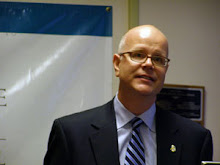
Or ... more precisely ... align your wheels with the direction you intend to travel.
The Congress will likely take another step forward this week when the Senate passes their version of an economic stimulus package. There will be a few big differences with the House version passed last week that can be worked out in conference. The President said that health insurance for the unemployed must be in the final package. The House accomplished this goal by opening the Medicaid program to the unemployed with 100% reimbursement to the states for both direct care AND new administrative costs (like outreach). The Senate isn't there, yet. Additionally, there will be a 65% up-front credit for those who can take advantage of their former employer's COBRA plan. The "take-up" rate for COBRA, however, has long remained in the single digits (+/- 9%) because it's just too expensive.
For the traditional Medicaid programs, the Federal "match" will increase by a minimum 4.9% -- that translates, generally, to 54.9 cents back to CT for every dollar spent. (For more information on those aspects of the plan, see Ellen Andrews' 1/29 post
here.)
The States will be the vehicle for getting this part of the stimulus pushed out to the people. But, there's a problem. States aren't created equally. States don't all have the same ability or will to execute the new plan. Some may actually pass up the money for fear that once the economic crisis passes the states will be responsible for a whole new population with rights to access to Medicaid (see Robert Pear's NYTimes piece
here).
Paul Krugman did a great job laying out concerns about the states based on
economic theories, but it may be more basic --
capacity.
Connecticut, for example, has shown a talent of late for turning good ideas and programs into embarrassing, expensive wrecks. The Medicaid program is underfunded; reimbursements to providers are too low to attract them into the system; and, the networks of providers who serve the existing populations of HUSKY A, HUSKY B and Charter Oak are unstable and dangerously inadequate now, so adding more lives to this system is almost not an option.
If our wheels are aligned in the direction we're headed, I don't see meaningful healthcare on the horizon. Rather, I see a 100 year-old oak tree in our immediate future. Brace yourself.



